LESSONS FOR POLICE OFFICERS FROM THE BHAGAVAD GITA

The Bhagavad Gita is a Sanskrit epic poem written about two millenniums ago, and it is a dialogue between the god Krishna and the warrior Arjuna. The topic of the Gita is the nature of the world and human existence. In this blog post, I will compare the Gita and the police profession. It is not an easy task to make those comparisons, but I will do my best. Rules and regulations govern police all over the world, and the Bhagavad Gita makes prescriptions on how to live in this world. The police act as guardians of law and order and as protectors of the people. They also work to reduce tension and restore peace in society. In the Gita, Krishna plays the role of teacher. He teaches Arjuna how to wage war justly and fight a battle without hatred or anger. Krishna also explains that one should fight a war only when necessary. The Gita has many similarities with the police profession. Here are a few. Both deal with reducing tension and restoring peace
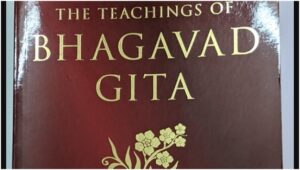
The Bhagavad Gita and the police profession are concerned with reducing tension and restoring peace in society. In his Kshetra Parva speech, Krishna says, “Bhava Shreshtha Shubha, Ganga, O Shakti! Making oneself and others happy is the duty of a king. If a king forgets this duty, there is no room for remorse. It is the same in a village. A king should rule by the principle of Vishnu and not by the principle of Jarasandha. One should not rule by reverting to one’s narrow selfish desires.” (12.39)
The Gita also emphasises the importance of non-violence and peace, saying, “The peace-loving Pandava is invincible in war. He who is full of compassion, is fearless and has control over his senses, is invincible.” (5.19)
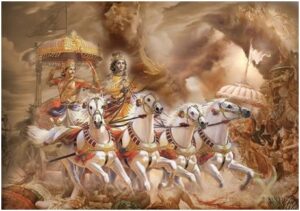
The Gita has a lot of similarities with the police profession
Like the police, the Gita aims at maintaining order in society. “… Those who are skilled in the art of governing have been established in this world to protect the people, to destroy evil and to promote dharma.” (1.2)
The Gita also has many rules and regulations that govern the behaviour of its disciples. “… One should always maintain a Gandharva (divine) rhythm in one’s life. One should not be lazy, torpid or a loafer. One should always be engaged in some righteous activity.” (6.38) The Gita also emphasizes the need for self-control, saying, “Brahmins, knowers of the Truth, should control their senses; those who do not control their senses are not qualified for control.” (3.43)
The Gita has many critical concepts for the police profession
Like the police, the Gita has concepts of authority and obedience. “One should always be obedient to one’s parents, teacher and the king. One’s sense of duty should be performed without any partiality.” (10.125). The Gita also has concepts of respect for elders, women, human life, and animals. “One should never do anything against the elders, whether one’s own or the other person’s. One should never do anything unrighteous or mean. One should not do anything to cause harm to a living being. (108) The Gita also has a concept of truthfulness, saying, “One should always live a life of truth. If someone tells a lie, one should not believe him. One should not repeat what one knows to be a lie. How can one believe in what one knows to be a lie? If one repeats a lie many times, one should remember that one is lying. One should never forget to lie.” (8.16)
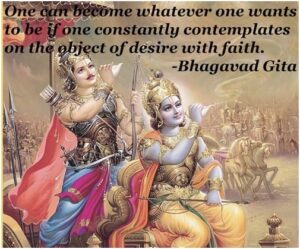
The Bhagavad Gita is an efficient guide for the police
Both address the violence inherent in human nature. The Gita addresses this issue in 2.17-19, saying, “One should never kill one’s self nor should one take the life of others, for in that case on, goes to the devil’ the not kill those born in one’s own family, those born in another’s family, those born in one’s age group, those born in another’s age group, those belonging to one’s occupational group or those who are poor. One should not kill those who are not culpable, those who are sick, those who are pregnant, those who are innocent, those who have just been born, those who are peaceful and those who are ignorant and in one’s age group.” The Gita also addresses the issue of fighting in the modern world, saying, “One should never use weapons that cause excessive injury or death. One should never fire at an army in the midst of a war. One should never fire at an army when it is retreating. One should never fire at an army when it is in the water or on a mountain.”
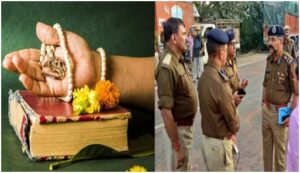
The Gita advocates impartiality, loyalty and condemns insubordination.
As I mentioned before, the Gita has many similarities with the police profession. Here are a few more examples.The Gita has a concept of the impartiality of the police. “… One should never act on behalf of one’s self or one’s friends or one’s relatives or one’s own household or one’s own village or one’s own town or one’s own country.” (6.37) The Gita also has a concept of loyalty to one’s superiors, saying, “When one has voluntarily accepted the office of a chieftain or a king, one should act according to one’s duty. One should never act against one’s superior.” (9.29) The Gita also has a concept of respect for one’s fellow officers, saying, “One should never speak of one’s comrades in a wrong way. One should never speak of one’s superiors in a bad way. One should always speak of one’s fellow-officers in a good way.” (8.32)

The Bhagavad Gita advocates acting against injustice.
Both the Gita and the police profession have to deal with difficult situations. Here are some examples from the Gita. The Gita has verses that address the nature of man, saying, “Man is a part of God and craves for God in everything he does. He who knows this becomes successful, but he who does not become a victim.” (8.19)
The Gita also has verses that address the nature of the police profession, saying, “Just as a solid manly wrestler does not allow a weaker man to sit or lie down comfortably in his own home; similarly, a police officer should not be a mute spectator to the misbehaviour of law-breakers to remain as. Likewise, police officers should constantly strive against transgression and injustice 13.40)

The Bhagavad Gita is an efficient guide for the police
Police can use Gita to deal with difficult situations in the police profession. Here are a few examples.The Gita has many verses about dealing with unruly or violent prisoners, saying, ” One should never feast on the food of those who are violent or unruly. One should never sleep on the bedding or the clothing of those who are violent or unruly. One should never sit or live at a place where such people have been allowed to stay.” (8.39). The Gita also has many verses about the proper interrogation of prisoners, saying, “One should not accept as true anything that is said while under the influence of anger or desire. One should not accept as true what is said out of fear or greed or as a result of a gift.” (8.41). As I mentioned before, the Gita can be a practical guide for the police profession.
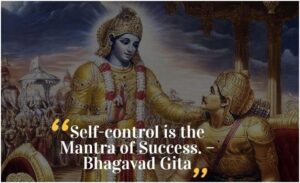
Conclusion
I hope that this blog post has provided some food for thought on the similarities between the police profession and the Bhagavad Gita. The main aim of both the Gita and the police profession is to protect and serve the people. Police have rules and regulations that govern their behaviour through the conduct rules and laws of the land. In contrast, the Gita has prescriptions for good conduct and behaviour for all in society. Bhagavad Gita focuses on the importance of doing one’s duty rather than on achieving targets. Failure to achieve targets makes police officers prone to worries which could lead to depression if the result is not favourable.So Gita rightly guides the police officers to focus on means rather than on the ends. Focussing on means, eschewing evil actions to fulfil desires, resisting temptations on the job and doing one’s duties fearlessly are the essential lessons of Gita that can help and guide police officers to do their duties well and enjoy their life which will eventually contribute to success in the job and happiness in their professional lives.
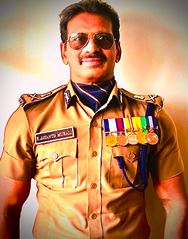 Dr.K. Jayanth Murali is an IPS Officer belonging to 1991 batch. He is borne on Tamil Nadu cadre. He lives with his family in Chennai, India. He is currently serving the Government of Tamil Nadu as Additional Director General of Police, Idol Wing CID.
Dr.K. Jayanth Murali is an IPS Officer belonging to 1991 batch. He is borne on Tamil Nadu cadre. He lives with his family in Chennai, India. He is currently serving the Government of Tamil Nadu as Additional Director General of Police, Idol Wing CID.
